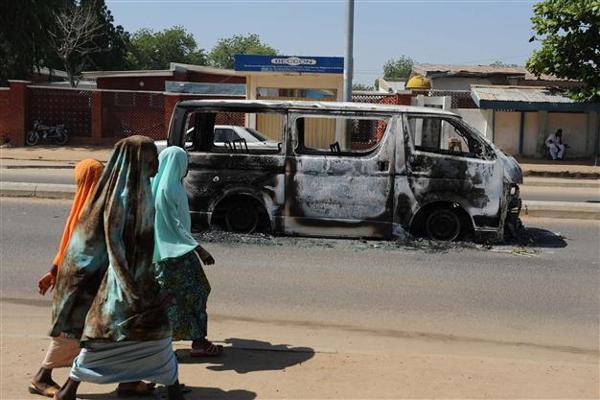At least 27 dead in church blast outside Nigerian capital: priest
ABUJA- Agence France-Presse


In this file photo taken on November 7, 2011 young girls walk past a vehicle burnt on November 4 on a street of Damaturu, Yobe State, northeastern Nigeria following a wave of deadly blasts claimed by Boko Haram, an Islamist sect based in the north of Africa's most populous country. AFP Photo
At least 27 were killed in Nigerian church explosion, priest said.
An explosion hit a church near the Nigerian capital Abuja on Christmas morning, an emergency official said, adding that there were casualties, but he could not immediately provide a figure.
"Explosion in St. Theresa Church close to Abuja," said Yushau Shuaib, spokesman for the National Emergency Management Agency of the blast in the Madalla area. "There are casualties, but we can't talk about figures for now." People were inside the church at the time of the blast, but Shuaib could not say how many. His agency called for ambulances to be provided to evacuate victims and said the area had been cordoned off.
Police also confirmed the explosion but could not immediately provide further details.
There was no immediate claim of responsibility, although Nigeria has been hit by scores of bomb blasts and shootings attributed to Islamist group Boko Haram.
The group claimed responsibility for the August suicide bombing of UN headquarters in Abuja that killed at least 24 people. A number of attacks have been carried out in the area of Suleija, also outside Abuja.
A series of bomb blasts in the central city of Jos on Christmas Eve 2010 were claimed by Boko Haram.
In recent days in three cities in the northeast, where most of the violence attributed to Boko Haram has occurred, attacks blamed on the sect followed by a heavy military crackdown killed up to 100 people, authorities and a rights group have said.
The chief of army staff, Lt. Gen. Azubuike Ihejirika, was quoted by local media as saying soldiers killed 59 Boko Haram members in the northeastern city of Damaturu. Shootouts had taken place on Thursday and Friday.
Others said the total death toll on all sides -- authorities, extremists and civilians -- could be as high as 100.
A purported spokesman for Boko Haram claimed responsibility for the initial violence in the three northeastern cities, saying they were revenge for a brutal military assault against the sect in 2009.
Violence blamed on the sect has steadily worsened in recent months, with bomb blasts becoming more frequent and increasingly sophisticated and death tolls climbing.
The attacks have continued despite well publicised raids on so-called bomb factories and arrests of a number of alleged Boko Haram members by authorities.
There has been intense speculation over whether Boko Haram has formed links with outside extremist groups, including Al-Qaeda's north African branch.
The group is believed to have a number of factions with varying aims.
It launched an uprising in 2009 that was put down by a brutal military assault which left some 800 dead as well as its mosque and headquarters in the northeastern city of Maiduguri in ruins.
It went dormant for about a year before re-emerging in 2010 with a series of assassinations.
